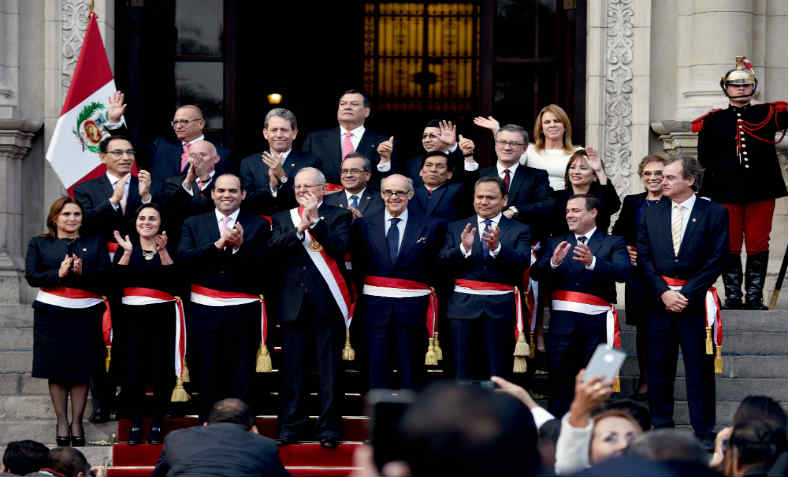 PPK and Cabinet. Photo: Wikimedia
PPK and Cabinet. Photo: Wikimedia
As the Peruvian establishment reels, the left must seize the moment, take to the streets and strike a blow, argues Jonathan Maunders
Peru was plunged into a corruption crisis over Christmas, the aftermath of which has shaken the country to its core. It has raised fundamental questions of the Peruvian establishment, its relationship with global corporations and its vile desperation to remain in power.
In December it emerged that Peru’s president, Pedro Pablo Kuczynski (PPK), had been implicated in a vast global corruption scandal. It became clear that a company the neoliberal PPK owned had strong ties to the Brazilian construction company Odebrecht, at the apparent centre of the scandal. In a 2016 plea bargain with the US Justice Department, Odebrecht admitted to paying in the region of $800m in bribes, mostly in South America, including $29m in Peru between 2009 and 2015.
In the fallout, PPK was naturally pressured to resign. He obstinately refused. In another situation, PPK could have been pushed out to be replaced by one of his deputies. This would be impossible. They were implicated too. PPK would soon confirm that if he were ousted by congress, they would follow him through the door, forcing new elections.
With PPK’s position seemingly untenable, the narrative quickly went from calls for resignation to calls for impeachment. It seemed a certainty. Peru’s congress is dominated by the country’s main opposition party, Fuerza Popular, an authoritarian right wing party in the image of former dictator Alberto Fujimori (we’ll come back to him shortly). It seemed that this party, led by Alberto’s daughter, Keiko, would carry through the impeachment process and ensure a new presidential election.
During the 11 hour impeachment debate, PPK professed his innocence, claiming he had been careless but had not lied. This from a 79 year old who made a long career from Wall Street did little to persuade the wider public.
What was to happen next was a surprise to all, surely including PPK himself. While it appeared that Fuerza Popular and smaller left wing groupings would ensure PPK’s demise, they didn’t. A faction from the former, led by Alberto Fujimori’s son (Keiko’s brother), Kenji, abstained and thus allowed PPK to stagger on as president.
This was a surprising move. Those cynical about South American politics would suggest a deal was afoot. The cynics would be right. On Christmas Eve PPK announced that Alberto Fujimori, responsible for the deaths of thousands of Peruvians, would be granted a pardon. Coincidences are rare in politics. He was finally imprisoned in 2009 for ordering death squads and vote-rigging amongst other obscenities, only to be granted release eight years later to save the failed presidency of one of his successors.
On Christmas Day, many protesters lined the streets of Lima to show their dissatisfaction at this decision. For many in Peru, Fujimori is a dark chapter in the country’s history; seeing him released in this manner has naturally led to an eruption of anger.
PPK ran his presidential campaign on his opposition to Fujimori’s daughter, Keiko, claiming he was the only candidate that could prevent the autocratic right from returning to office and winding the clock back to Fujimori’s time in power. He beat her by a slim margin, only to release the harbinger of 90s terror in Peru himself. This is not evidence of the principled liberal veteran built up by many in the election, but instead of a corrupt careerist clinging desperately to power in any way he can (a view unfashionable during the election).
As I pointed out in my previous article on the Peruvian election, the country’s mainstream left made an immense tactical blunder during the election. This blunder will now haunt them all over again. The Peruvian left, led by the diminished Vero Mendoza, made the decision to publicly back PPK after losing in the penultimate round of the election. Unlike Mélenchon in France, who refused to back publicly either the neoliberal establishment candidate or the far-right one, Mendoza put all her weight behind the former.
Clearly it is natural for the left to want to stand against the far right in any way, however standing behind capital’s horse has never been the right way. Having run a campaign firmly against the establishment, subsequently backing PPK alienated many, a trend continuing beyond the election. Many now associate PPK’s failures with Mendoza’s tacit approval.
Furthermore, Mendoza defended her actions, saying it was the only way to defend the country from the Fujimoristas. PPK has now betrayed this trust. The establishment isn’t powered by trust but instead power and capital. It can never be trusted to defend against the far-right, it’s too busy negotiating with it.
While the Peruvian parliamentary left is in a position of weakness, this situation provides a real opportunity for those on the ground. The many taking to the streets to oppose Fujimori’s release since Christmas, shows there is a strong appetite to oppose the status-quo. If the left can harness this power and direct the anger and narrative, they could have an enormous effect. PPK may have survived the impeachment process, but his popularity is at an all-time low. This is the opportunity to hammer him, not to allow the right in but to instead deliver an enormous blow to the establishment. This involves more than protests against Fujimori’s release. It must involve a cohesive campaign that directly links it to the government’s corruption, in this manner protests could be vital. Peruvian politics is in a state of crisis. It is time for the left to respond.

